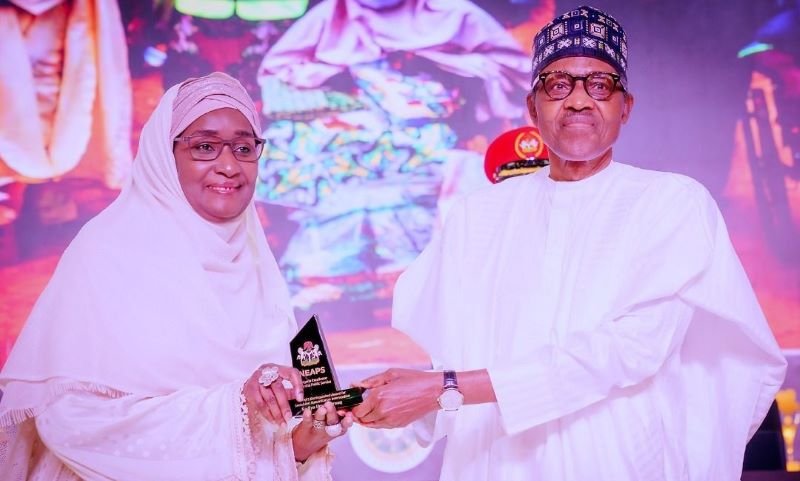FORMER Minister of Humanitarian Affairs, Disaster Management and Social Development, Hajiya Sadiya Umar Farouq has paid an emotional tribute to the late President Muhammadu Buhari, describing him as a father figure, a moral compass and a transformational leader who redefined service to the nation.
In a heartfelt statement issued late on Monday and made available to News Point Nigeria, the former minister recounted her decades-long relationship with the former president, highlighting how his values shaped her personal and political life.
Farouq recalled her first encounter with Buhari in the modest setting of Ahmadu Bello University, Zaria, where he had come to visit his daughter, her classmate at the time.
“Even then, he carried himself with a quiet dignity that left a lasting impression on me as a young girl,” she wrote.
Years later, their paths crossed again this time on the political battlefield. As a young member of The Buhari Organization (TBO), she witnessed firsthand the birth of what would become a national reform movement, first under the All Nigeria Peoples Party (ANPP), then the Congress for Progressive Change (CPC), and finally the All Progressives Congress (APC).
“In those early CPC days,” she said, “he was not just a party leader; he was a mentor who believed in cultivating future leaders based on merit and patriotism.”
Farouq emphasized that Buhari’s leadership was never about personal gain, but about serving Nigeria with discipline, humility, and focus. She described him as a man driven by principles rather than popularity.
“As Minister under his administration,” she said, “I saw his values in action.
He believed in competence, not noise; in results, not rhetoric. He never demanded sycophancy only service, truthfulness, and performance.”
Farouq credited Buhari’s foresight for the creation of the Ministry of Humanitarian Affairs and its impactful initiatives, such as the National Social Investment Program (NSIP), the largest social protection effort in sub-Saharan Africa.
“Those policies weren’t designed from afar. They came from his deep understanding of poverty and suffering, born of his own childhood experiences in Daura.”
The tribute also highlighted Buhari’s leadership during national emergencies, especially the COVID-19 pandemic.
“I remember the late-night strategy meetings, the data reviews, the urgent mobilization to reach millions of affected citizens,” Farouq recalled. “Through it all, he remained calm, focused, and empathetic.”
She said the president paid close attention to the plight of the displaced, the orphans, the widows, and the underserved even in moments of national silence.
“He never stopped thinking about how the government could do better,” she added.
To Farouq, Buhari was more than her Commander-in-Chief; he was a teacher and a personal mentor.
“At a time when tokenism often limited women’s roles in politics, he believed in me. He gave me the platform to serve and grow. His trust was never transactional. It was earned, and it came with great responsibility.”
She praised his austere lifestyle, his resistance to excess, and his relentless focus on legacy over luxury citing the Second Niger Bridge, railway expansion, and agriculture reforms as projects that reflected his commitment to nation-building beyond his tenure.
“His passing is not just the loss of a former president. It is the end of a political generation defined by discipline, patriotism, and frugality,” she wrote.
“He governed with restraint and uncommon integrity.”
Sadiya concluded her tribute with a promise to carry forward the values he taught: “I will tell the next generation that I served under a president who put the people before politics, and who walked away from power with the same simplicity with which he entered it.
“He taught us that power is transient, but character endures.”







